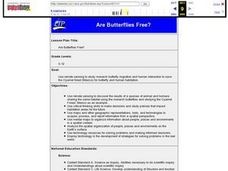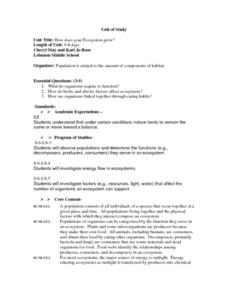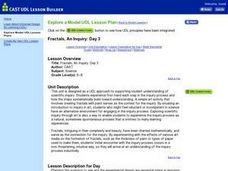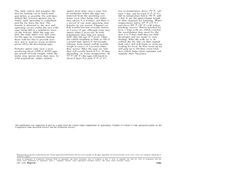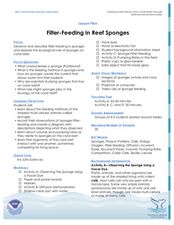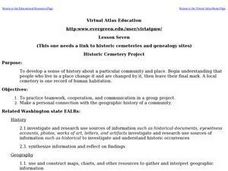Columbus City Schools
Get Your Organisms Organized
From large to small, show your class how to organize them all! Included within the guide is everything you need to take their knowledge of classification from the cellular to the species level. The worksheets focus on...
Curated OER
Get in the Newspaper Habit
Dive into journalism with your high schoolers! The resources provided here will help your learners write unbiased, clear, and succinct newspaper articles. First they spend time sifting through stacks of articles, filling out a graphic...
Children’s Hospital of Philadelphia
Meet the Germs
A lesson introduces scholars to the scientist, Martinus Beijerinck, the person behind virus discovery. Learners research and complete a graphic organizer that showcases the differences between a virus and bacteria. Small groups share...
Curated OER
Are Butterflies Free?
Students use remote sensing to study monarch butterfly migration and human interaction to save the Oyamel forest (Mexico) for butterfly and human habitation.
Curated OER
How Does Your Ecosystem Grow?
Students consider that under certain conditions in nature tend to remain the same or move toward a balance. They observe populations and determine the functions (e.g., de-composers, producers, consumers) they serve in an ecosystem. They...
Curated OER
Mammals of the Deep Blue
Third graders study ocean mammals. They explore various websites and databases to answer questions and record answers about whales and dolphins. Finally they use the information obtained to write a report about them.
Curated OER
Human Reproduction
Students study the basic terminology of male and female reproductive organs. They explain the human reproductive process, infertility, pregnancy, and steps that lead to a healthy lifestyle. They give their definition and then discuss...
Curated OER
Fractals, An Inquiry: Day 3
Young scholars develop questions for their inquiries and plan their experiments. They are supported by a modeled case study of Max the Dog's Inquiry Planning Process, as well as supported by a planning template, The Inquiry Organizer.
John F. Kennedy Presidential Library & Museum
Red States/Blue States: Mapping the Presidential Election
Young historians investigate how voting patterns have changed by comparing the outcome of the 1960 election to the outcome of the recent election. A creative final assessment has participants making a news show wherein they provide...
Curated OER
Ants
Third graders study the habits and habitats of ants. They research the use of technology as a valuable investigation tool and access other web sites for future research projects. The students make successful decisions while playing SimAnt.
Curated OER
You Are What You Eat: Lessons from Alice Waters
Students view the AMERICAN MASTERS episode titled ALICE WATERS AND HER DELICIOUS REVOLUTION. They examine their own eating habits and determine how they can eat food that is both healthier and tastier. Through Guided Reading strategies,...
Curated OER
The Human Organism
Students identify their feelings and learn constructive ways of handling conflict. In this feelings and conflict lesson, students read a story about conflict and identify ways to understand emotions and resolve conflict.
Curated OER
My Favorite Breakfast Foods
First graders consider the importance eating breakfast. In this breakfast foods lesson, 1st graders plan meals, examine a variety of breakfast options, and discuss the food groups. Students taste a variety of foods. Extension activities...
Curated OER
Best Breakfast Authors
Third graders write a story. For this breakfast authors lesson, 3rd graders write about a breakfast food and why it is a good selection. Students may illustrate stories and share with their peers.
Curated OER
Channel Catfish
Students study the life and biology of the Channel Catfish. In this aquatic biology lesson, students will examine the external and internal features of the catfish along with their breeding habits and environment. This lesson includes...
Teach Engineering
Constructing Sonoran Desert Food Chains and Food Webs
Investigate desert biomes by creating food chains and food webs. Groups first research feeding habits of organisms in the Sonoran Desert. This information helps pupils draw food chains and webs to determine relationship between organisms.
Curated OER
Filter Feeding in Reef Sponges
Learners investigate the role of sponges in our oceans. In this biology lesson, students create a diagram visualizing how sponges bring food into their bodies through a filtering process. Learners discuss the connections...
Curated OER
Where to shop?
Students study a topic of an environmental nature that is relevant to them (as individuals) on a local level, but with global implications. They consider whether their family's shopping habits have any lasting effects on the environment.
Curated OER
Introduction to the Barnegat Bay Estuary
Students research estuaries. In this estuaries lesson, students discuss the differences in a bay and an ocean. Students watch a PowerPoint of the properties of the estuaries and geography of Barnegat Bay. Students complete a worksheet...
Curated OER
Exploring the Maryland State Archives Website
Student demonstrates the ability to organize, manage and comprehend information and applies appropriate skills to collect organize, and interpret data, They then explore an appreciation of media a sources of information and recreation.
Curated OER
"Julie of the Wolves"
Fifth graders research life in Alaska and compare life there to their lives in this lesson. They read "Julie of the Wolves." They research through the novel and other reference books facts about the Alaskan climate and geography. They...
Curated OER
Explore the Food Web
Students identify plants and animals in the journals of Lewis and Clark's expedition. They describe the various animal habits. Students interpret the behaviors of the animals discovered on the expedition. They design a food web using...
Curated OER
What's on the Outside/Inside?
Students read about the idea of gender perspective in the writing of German history. They generate definitions from a list of given vocabulary words. They write definintions using their own words.
Curated OER
Historic Cemetery Project
Students use the Virtual Atlas to examine the cemetaries in the state of Washington. In groups, they view photographs of local monuments to celebrate the lives of local members. They choose one to focus on and research. To end the...



